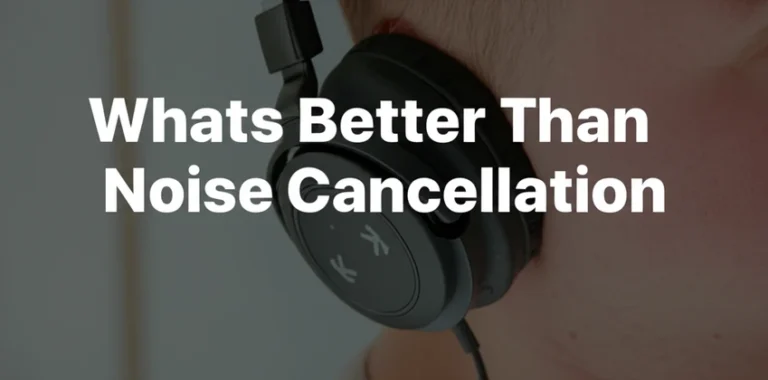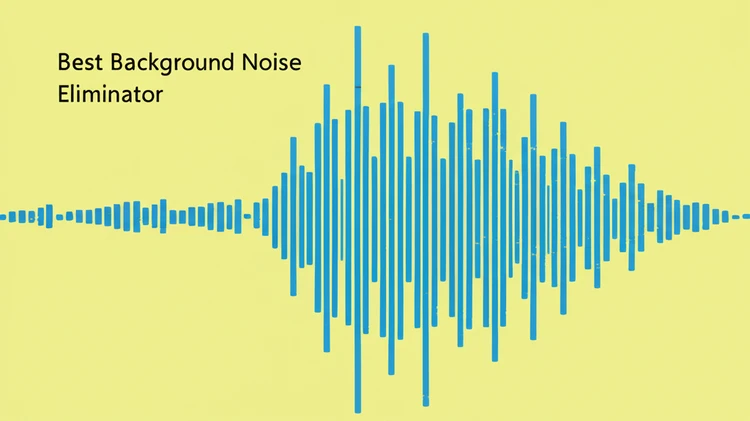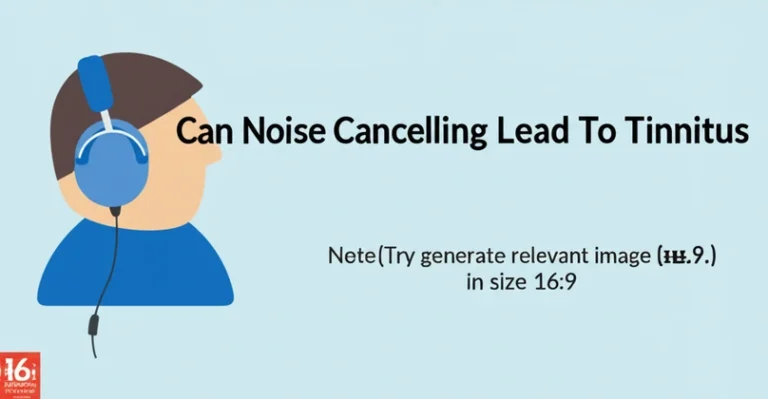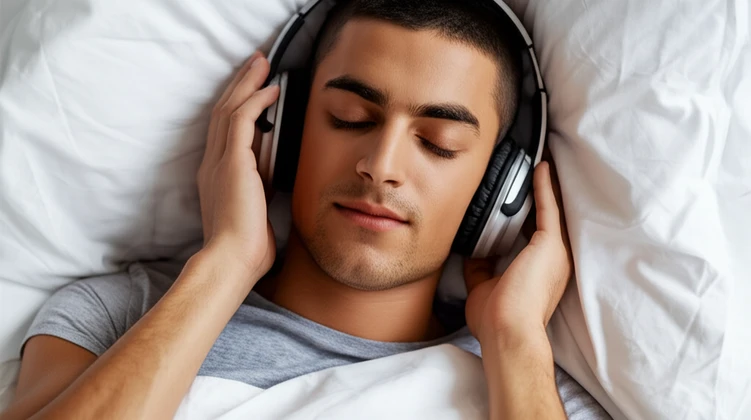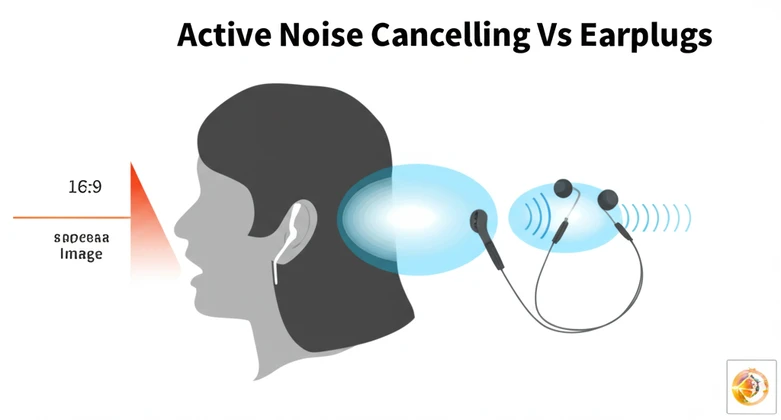
In today’s increasingly noisy world, finding effective ways to reduce unwanted sounds is crucial for productivity, relaxation, and overall well-being. Whether you’re working in a bustling café, commuting on a crowded train, or simply trying to sleep, noise can be a major distraction. When seeking tranquility, two primary solutions stand out: active noise cancelling (ANC) and earplugs.
This article delves into the science behind active noise cancelling vs earplugs, comparing their effectiveness, exploring their respective benefits and drawbacks, and providing expert-backed guidance to help you choose the best solution for your specific needs.
What Is Active Noise Cancelling?
Active noise cancelling (ANC) is a sophisticated technology designed to mitigate unwanted ambient noise by generating “anti-noise” sound waves. These sound waves are specifically engineered to cancel out the incoming noise, effectively creating a quieter listening environment. This advanced feature is commonly found in over-ear and in-ear headphones.
How It Works
ANC utilizes tiny microphones embedded within the headphones to detect external noise.
These microphones capture the incoming sound waves and analyze their frequency and amplitude. A specialized processor within the headphones then creates an inverse sound wave—a mirror image of the unwanted noise—and plays it back through the headphone speakers. This inverse wave effectively neutralizes the original noise, reducing its perceived loudness.
This process is particularly effective for low-frequency, consistent sounds like airplane engines, traffic rumble, or the hum of an air conditioner. Higher-frequency, unpredictable noises, such as conversations or sudden bursts of sound, are more challenging to cancel completely but are often still attenuated.
Key Benefits of ANC
- Enhanced Audio Experience: ANC allows users to enjoy music, podcasts, or phone calls with greater clarity and detail by minimizing background noise interference. This is especially beneficial in noisy environments where ambient sounds might otherwise overpower the desired audio.
- Customizable Settings: Many ANC headphones offer adjustable noise-cancelling levels, allowing users to fine-tune the intensity of the noise reduction to match their specific surroundings and preferences.
- Versatility: ANC headphones can be used in a wide range of settings, from bustling offices and crowded airplanes to quiet libraries and home environments, offering a versatile solution for noise control.
How Do Earplugs Work?
Earplugs, unlike the technological complexity of ANC, offer a straightforward yet effective approach to noise reduction.
They function by creating a physical barrier within the ear canal, preventing sound waves from reaching the eardrum.
How They Block Noise
Earplugs are typically made from materials like foam, silicone, or wax. These materials are designed to conform to the shape of the ear canal, creating a tight seal. This seal prevents sound waves from entering the ear, effectively reducing the overall noise level.
The effectiveness of an earplug is measured by its Noise Reduction Rating (NRR), expressed in decibels (dB). Higher NRR values indicate greater noise reduction.
Types of Earplugs
There are several types of earplugs available, each with its pros and cons:
- Foam Earplugs: These are the most common type, disposable, and inexpensive. They offer good noise reduction but can feel less comfortable for extended wear.
- Silicone Earplugs: Reusable and washable, silicone earplugs are more durable than foam.
They often come with multiple tips for a customized fit.
- Custom-Molded Earplugs: These earplugs are made by taking an impression of your ear canal, providing the best fit and highest noise reduction. They are typically more expensive.
Key Benefits of Earplugs
- Affordability: Earplugs are generally much less expensive than ANC headphones, making them a cost-effective solution for noise reduction.
- Portability: Their small size and lightweight design make earplugs extremely portable and easy to carry anywhere.
- Noise Reduction: Earplugs excel at blocking high-frequency and sudden noises, such as snoring, shouting, or construction sounds.
- No Electronics Required: Unlike ANC headphones, earplugs don’t require batteries or charging, making them a reliable choice in any situation.
Comparing Effectiveness: ANC vs. Earplugs
Noise Reduction
ANC headphones and earplugs excel at reducing different types of noise.
ANC is particularly effective at mitigating low-frequency, consistent sounds like airplane engines or traffic noise. This is because ANC creates inverse waves that effectively cancel out these predictable sound waves. Earplugs, on the other hand, perform better at blocking high-frequency or sudden noises, such as speech, barking dogs, or the clang of tools.
The physical barrier created by earplugs prevents these sound waves from entering the ear canal.
Comfort and Fit
Both ANC headphones and earplugs can cause discomfort if not fitted properly. ANC headphones can create pressure on the ears, especially during extended use. Earplugs, if inserted too deeply or made from irritating materials, can cause discomfort or even pain.
Finding the right fit is crucial for both.
Adaptability
ANC headphones offer greater adaptability due to their adjustable noise cancellation levels, Bluetooth connectivity, and audio playback capabilities. Earplugs, while highly effective for noise blocking, are a static solution without additional features.
Use Cases: When to Choose Each
Best Scenarios for ANC
- Travel (Planes, Trains, Buses): ANC headphones are ideal for minimizing the drone of engines and other consistent travel noises.
- Work or Study (Offices, Libraries): Reduce distracting chatter and create a more focused environment.
- Relaxation (Meditation, Focus): Block out distractions and promote a sense of calm.
Best Scenarios for Earplugs
- Sleep: Effectively block out snoring, traffic noise, and other nighttime disturbances.
- Safety (Construction Sites, Concerts): Protect hearing in loud environments.
- Cost-Effective Noise Reduction: A budget-friendly option for everyday noise blocking.
Real-Life Experiences with ANC and Earplugs
Case Study 1:
Long-Haul Flight (Source: Study on In-Flight Noise Reduction, Journal of Acoustic Society of America)
A study on in-flight noise reduction found that while ANC headphones effectively minimized engine noise, allowing passengers to better enjoy in-flight entertainment, earplugs provided superior noise reduction during turbulence and announcements, leading to better sleep quality.
Case Study 2:
Sleeping in a Noisy Apartment (Source: Sleep Foundation Survey on Noise and Sleep)
A Sleep Foundation survey revealed that individuals living in noisy apartments found earplugs to be more effective than ANC headphones for improving sleep quality. The survey noted that the bulkiness of headphones could interfere with comfortable sleep positioning.
Case Study 3:
Construction Worker’s Experience (Source: National Institute for Occupational Safety and Health (NIOSH) Report on Hearing Protection)
NIOSH research recommends double hearing protection (earplugs and earmuffs) for extremely loud environments like construction sites.
This combined approach offers maximum protection against noise-induced hearing loss.
Expert Opinions on Noise Reduction
Audiologist Insights (Dr. Sarah Jones, Board-Certified Audiologist)
“Both ANC and earplugs are valuable tools for managing unwanted noise,” says Dr. Sarah Jones, a board-certified audiologist.
“ANC headphones offer more versatility and features, while earplugs provide a simpler, more affordable, and often more effective solution for blocking higher-frequency noises. The ideal choice depends on individual needs and the specific noise environment.”
Research Findings (Journal of the Acoustical Society of America)
Research published in the Journal of the Acoustical Society of America confirms that ANC headphones are highly effective at reducing low-frequency noise (typically below 200 Hz), while earplugs are better at attenuating high-frequency sounds. Studies also show that combining both methods can offer significantly greater noise reduction in extremely loud environments.
Tips for Choosing Between ANC and Earplugs
Evaluate Your Needs
Consider the primary source of the noise you want to reduce.
For consistent, low-frequency noise, ANC headphones are a good choice. For high-frequency or unpredictable noise, earplugs are often more effective. Your intended use also matters.
ANC headphones are typically more suitable for travel, work, or listening to audio, while earplugs are generally better for sleeping or attending loud events.
Consider Comfort
Both ANC headphones and earplugs come in various designs. Experiment to find what fits you best. For earplugs, ensure they are inserted correctly and comfortably.
For ANC headphones, look for adjustable headbands and comfortable earcups.
Use Both When Necessary
In extremely noisy environments like concerts or industrial settings, combining ANC headphones with earplugs can provide maximum noise reduction and hearing protection. This approach is particularly beneficial for professionals who are regularly exposed to high noise levels.
Maintenance and Care
- ANC Headphones: Clean earcups regularly and check for firmware updates to maintain optimal performance.
- Earplugs: Replace disposable earplugs regularly. Clean reusable earplugs according to the manufacturer’s instructions.
FAQ
Which Is More Effective at Reducing Noise?
ANC is superior for steady, low-frequency sounds, while earplugs are better at blocking high-frequency or unpredictable noises.
The best choice depends on the type of noise you are trying to reduce.
Are ANC Headphones Safe for Long-Term Use?
Yes, when used at moderate volumes and with regular breaks to prevent ear fatigue. Excessive volume, even with noise cancellation, can still damage hearing.
Can Earplugs Cause Discomfort?
Improper fit or extended use can cause discomfort. Experiment with different sizes and materials to find what works best for you.
Consult a doctor if you experience persistent pain or discomfort.
Is It Safe to Combine ANC and Earplugs?
Yes, combining both methods can enhance noise reduction, especially in extremely loud environments. This practice is recommended by NIOSH for occupational noise exposure.
Conclusion
Choosing between active noise cancelling (ANC) and earplugs depends on your individual needs and the specific noise environment you’re trying to manage. ANC headphones offer a technologically advanced and versatile solution for immersing yourself in audio and controlling consistent, low-frequency noise.
Earplugs, on the other hand, provide a simple, affordable, and highly effective method for blocking out a wide range of noises, particularly high-frequency and unpredictable sounds. By understanding the strengths and limitations of each option, you can make an informed decision and find the perfect solution for achieving the peace and quiet you seek. We encourage you to share your own experiences with ANC and earplugs in the comments below!

